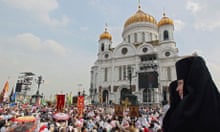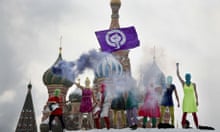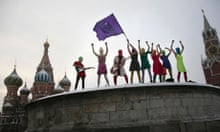Eight women stood in a line opposite the Kremlin, neon balaclavas hiding their faces, fists pounding the air in rugged defiance. Before police carted them off, the members of Pussy Riot managed to shout their way through a minute-long punk anthem: "Revolt in Russia – the charisma of protest / Revolt in Russia, Putin's got scared!"
Formed days after Vladimir Putin's announcement in September that he intended to return to the presidency, Pussy Riot have become the latest symbol of young Russian discontent.
"A lot of us couldn't sleep after this announcement," said "Tyurya", one of the founding members of a punk collective that has grown, since October, to roughly 30 people, including crew. "So we decided, damn it, we need to do something. We always went to protests and things, but it seemed to us we needed to do something more."
The mid-January performance on Red Square, brazen in its choice of location and lyrics, catapulted the all-female punk band into the pantheon of Russia's increasingly creative protest movement.
Pussy Riot are sworn to anonymity, hence the colourful balaclavas members use to hide their faces, even when giving interviews. "It shows we can be anybody," says a band member who goes by the name Garadzha, wearing a hot-pink ski mask and matching stockings.
They decline to reveal the smallest details, aiming to maintain total secrecy. They will say only that most of the band members met at the small protests held by Russia's once-feebled opposition, from monthly illegal demonstrations calling for the right to assembly to banned gay pride marches. Their average age is 25. They are hardcore feminists. Most studied the humanities in university. They won't detail their day jobs.
What united them in October was the feeling that something had to change in the country and in its culture of protest, which, until tens of thousands took to the streets after contested parliamentary elections in December, had had hardly any effect on the political discourse.
"We understood that to achieve change, including in the sphere of women's rights, it's not enough to go to Putin and ask for it," said Garadzha. "This is a rotten, broken system."
Her bandmate Tyurya said: "The culture of protest needs to develop. We have one form, but we need many different kinds."
The band began writing songs with lyrics such as: "Egyptian air is good for the lungs / Do Tahrir on Red Square!" and performing on trams and in the metro. Videos of the flash gigs began spreading across the internet. When the protest leader Alexey Navalny was jailed for 15 days after his arrest during Russia's first post-election protest on 5 December, three members of Pussy Riot took to the roof of the jail where he was being held, setting off red flares as they sang "Death to prison / Freedom to protest!"
The fear of arrest long ago left the band members, steeped in the tradition of illegal protest. "We have experience with it, we've been detained at protests before," said Tyurya. "It's not scary – you're surrounded by good, normal people, those who protest against Putin."
All eight women were detained during the Kremlin performance, questioned and released. Most got off with administrative fines rather than the 15-day jail sentences often doled out to those who stage illegal protests.
"The revolution should be done by women," said Garazhda. "For now, they don't beat or jail us as much."
"There's a deep tradition in Russia of gender and revolution – we've had amazing women revolutionaries."
The band is getting ready for its next performance, something that usually takes a month to pull together. Its members don't discuss plans on the telephone or give away details, out of fear that the security services will disrupt the project. Is what they do art or politics? "For us it's one and the same."
They won't be wearing their radical outfits when attending Moscow's next big protest on Saturday, as the opposition hopes to build on the momentum of two major protests in December that brought tens of thousands to the streets of the Russian capital. But like all good punks, the band wants to see the protest movement develop beyond legal boundaries.
"Putin and his team are behaving so rudely, and the people aren't ready to react in the same way – they want all these protests to be sanctioned," said Tyurya. "But that's what's needed when you're fighting an illegitimate government. They're basically occupiers, they don't have the right to be here – why should things be agreed with them?"
That was a sentiment that began to arise among some of Moscow's protesters in late January, when negotiations between organisers and the mayor's office dragged on as authorities sought – and ultimately failed – to push the demonstration to Moscow's outskirts. Protesters will march on Saturday towards Bolotnaya Square, across from the Kremlin. Tens of thousands are expected, despite a temperature of -20C.
Putin is still widely expected to win the presidential election on 4 March and remains the country's most popular politician, something his critics attribute to the state's monopoly on television and access to politics. Liberal politicians are regularly denied the right to register parties, and the candidacy of Grigory Yavlinsky, the leader of the liberal Yabloko party, was declared invalid last week.
Yet analysts say Putin's ability to govern unchallenged will be severely hampered by the negative reaction to his return. It has not only rocked the Russian elite, but led to a renewal of spirit in Russia's creative classes. Satirical programmes find no place on state-run television but have blossomed on the internet. Moscow theatres are staging overtly anti-regime plays. And Pussy Riot, who cite riot grrrl pioneers Bikini Kill and cult heroes Sonic Youth as inspiration, continue to perform.
"We wanted to create a new form of protest – maybe not such a huge one, but we compensate for that with the bright, provocative and illegal nature of our performances," Tyurya said.
Like Russia's tens of thousands of protesters, the band members don't know how the authorities will react next time. "After Red Square, they took us roughly, got even angrier than usual," Tyurya said. "The phrase 'Putin's got scared' – it was a real slap in their faces."






